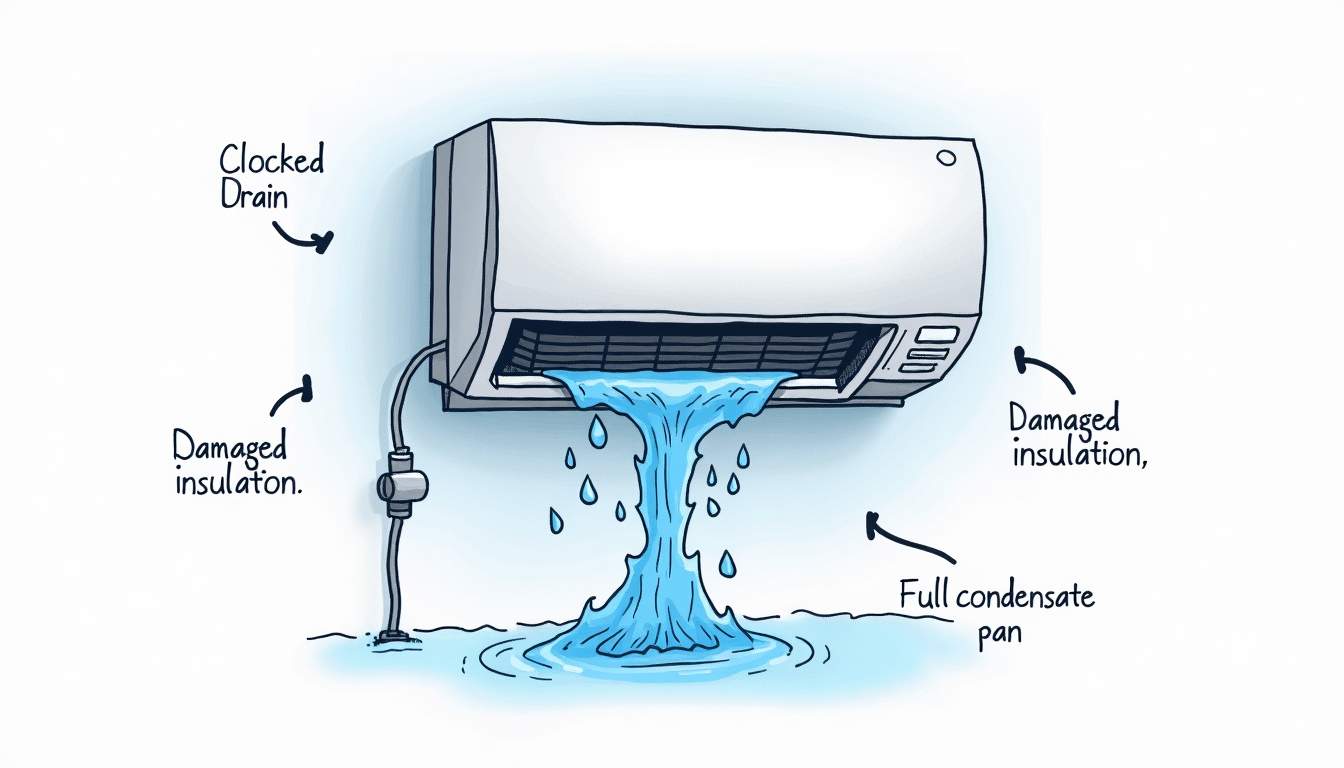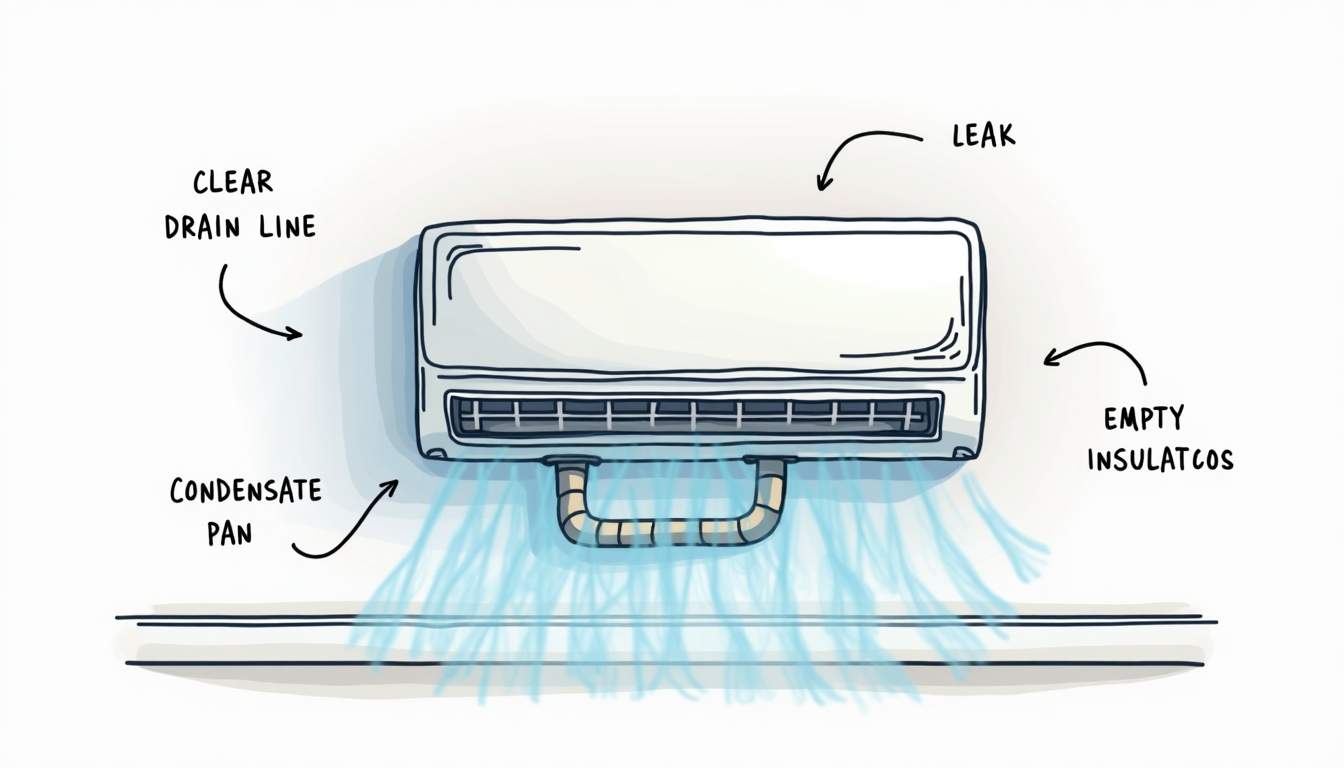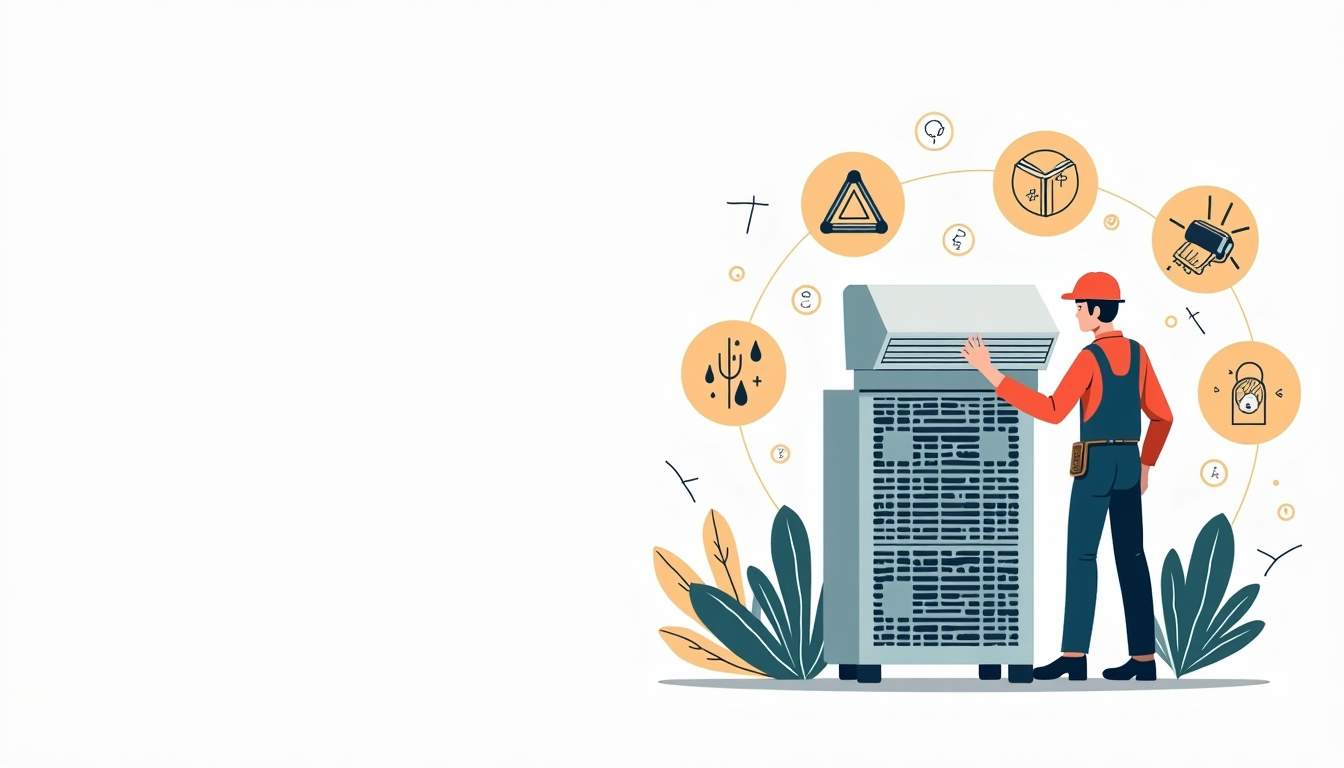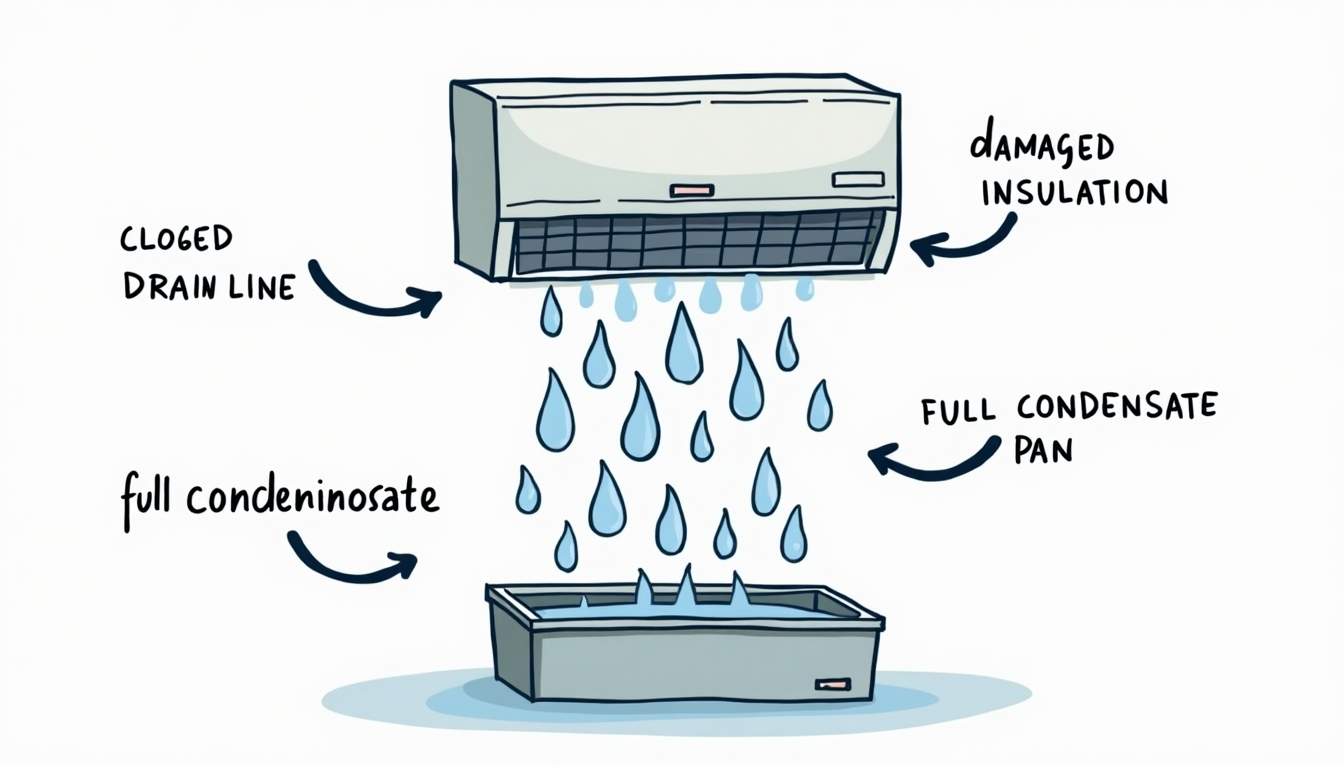
Noticing a puddle forming beneath your air conditioner can be alarming. A leaking aircon isn’t just messy-it often signals an underlying problem that, if ignored, might lead to costly repairs or reduced cooling efficiency. Understanding why your air conditioner is leaking water and how to fix it is key to keeping your home comfortable and your unit running smoothly.
Why Is My Air Conditioner Leaking Water?
Air conditioners naturally produce water as they cool the air. This happens because the unit removes moisture from the warm air inside your home, which then condenses on the evaporator coils. Normally, this water drips into a drain pan and flows out through a drain line. When everything works as it should, you never see a drop of water inside your home.
Leaks occur when this water doesn’t drain properly or when there’s a mechanical issue causing water to escape where it shouldn’t. Pinpointing the exact cause can save you time and money, so let’s break down the most common reasons your aircon might be leaking.
Clogged Drain Line
The most frequent culprit behind an air conditioner leak is a clogged condensate drain line. Dust, dirt, and algae can build up inside the drain pipe, blocking the flow of water. When this happens, water backs up and overflows from the drain pan, dripping inside your home or onto the floor.
It’s a simple fix in many cases—clearing the blockage restores proper drainage. However, if left unattended, the water buildup can damage your walls, flooring, and even the aircon unit itself. Regular maintenance, such as flushing the drain line with a mixture of vinegar and water, can help prevent clogs from forming in the first place, ensuring your air conditioner operates smoothly and efficiently.
Damaged or Rusted Drain Pan
Underneath the evaporator coils is a drain pan designed to catch condensation. Over time, this pan can rust or crack, especially in older units. When that happens, water leaks out instead of being funneled safely through the drain line.
Replacing a damaged drain pan is often necessary to stop leaks. Ignoring the issue can lead to water damage and mold growth around your air conditioner. It’s also worth noting that a rusted pan may indicate that the unit is aging and could require more extensive repairs or even replacement. Regular inspections can help identify these issues early, allowing you to maintain a healthy indoor environment. For reliable inspections or repairs, you can visit LS Aircon Servicing for professional assistance.
Frozen Evaporator Coils
It might sound odd, but frozen coils can cause water leaks. When the evaporator coils freeze up, the ice eventually melts and creates excess water that the drain pan can’t handle. This overflow leads to leaks around the unit.
Frozen coils usually indicate other problems like low refrigerant levels, poor airflow due to dirty filters, or malfunctioning fans. Fixing the root cause prevents the coils from freezing again and stops the leaks. Additionally, ensuring that your air filters are changed regularly and that your system is serviced annually can help maintain optimal airflow and prevent ice buildup on the coils.
Improper Installation or Tilt
If your air conditioner isn’t installed correctly or is tilted the wrong way, water may not flow toward the drain pan as intended. Instead, it can pool inside the unit and leak out.
Checking the unit’s level and ensuring proper installation can resolve this issue. If you suspect this is the problem, a professional technician can adjust the setup for optimal drainage. Proper installation not only prevents leaks but also enhances the overall efficiency of your air conditioning system, ensuring it cools your home effectively while minimizing energy consumption.
High Humidity and Excess Moisture
In regions with high humidity, your air conditioner has to work harder to remove moisture from the air. This can sometimes produce more condensation than usual, overwhelming the drain system and causing leaks.
While this isn’t a mechanical fault, ensuring your drain line and pan are clear and in good condition helps manage the extra moisture effectively. Additionally, using a dehumidifier in particularly humid areas can alleviate some of the strain on your air conditioning system, leading to improved performance and reduced risk of leaks. Monitoring indoor humidity levels can also help you determine if your air conditioning system is adequately sized for your space, as an undersized unit may struggle to keep up with moisture removal demands.
How to Fix a Leaking Air Conditioner
Once you know why your air conditioner is leaking, you can take steps to fix it. Some fixes are simple and can be done yourself, while others require professional help.
Clear the Drain Line
For clogged drain lines, start by turning off the air conditioner. Locate the drain line-usually a PVC pipe near the outdoor unit or behind the indoor unit. Use a wet/dry vacuum to suck out any debris clogging the pipe. Alternatively, you can flush the line with a mixture of bleach and water to kill algae and clear blockages.
Regular maintenance, like flushing the drain line every few months, can prevent future clogs and leaks. Additionally, consider installing a drain line float switch, which can automatically shut off the air conditioner if the drain line becomes clogged, providing an extra layer of protection against leaks.
Replace or Repair the Drain Pan
If the drain pan is cracked or rusted, it needs attention. Minor rust spots can sometimes be treated with rust-resistant paint, but cracks usually mean replacement is the best option. Drain pans are relatively inexpensive and can be swapped out by a technician.
Ignoring a damaged pan risks water damage and mold growth, so don’t delay repairs. It’s also wise to inspect the area around the drain pan for signs of water damage or mold, as these can indicate ongoing issues that need to be addressed promptly to maintain a healthy indoor environment.
Address Frozen Evaporator Coils
If you notice ice on your coils, turn off the air conditioner immediately to let the ice melt. Check and replace dirty air filters, which restrict airflow and contribute to freezing. If the problem persists, low refrigerant or faulty fans may be to blame, and a professional should inspect the unit.
Preventing coil freeze-ups keeps your aircon running efficiently and prevents leaks. Regularly monitoring the temperature settings and ensuring that the thermostat is functioning correctly can also help maintain optimal performance and prevent unnecessary strain on the system.
Correct Installation Issues
If your air conditioner isn’t level, water won’t drain properly. Use a carpenter’s level to check the unit’s position. Small adjustments can sometimes be made by shifting the unit or adjusting mounting brackets. For more complex installation problems, calling a professional is the safest bet.
Proper installation not only affects drainage but also impacts the overall efficiency of your air conditioning system. Ensuring that the unit is installed in a shaded area can also help reduce the workload on the system, leading to improved performance and energy savings.
Manage High Humidity
When humidity is the issue, consider using a dehumidifier alongside your air conditioner to reduce moisture levels. Make sure your drain line and pan are clean and functioning well to handle the increased condensation.
Additionally, sealing windows and doors can help keep humidity at bay, as well as using exhaust fans in areas prone to moisture, like kitchens and bathrooms. Monitoring indoor humidity levels with a hygrometer can provide valuable insights, allowing you to take proactive measures to maintain a comfortable and dry environment in your home.
Preventing Future Aircon Leaks
Prevention is always better than repair. Regular maintenance keeps your air conditioner in good shape and reduces the risk of leaks.

Routine Cleaning and Maintenance
Change or clean air filters every 1-3 months to maintain proper airflow. Clean the evaporator coils annually to prevent dirt buildup. Flush the drain line with a bleach solution regularly to stop clogs before they start.
Scheduling professional tune-ups once a year can catch potential issues early and keep your system running smoothly.
Watch for Early Signs
Pay attention to unusual sounds, reduced cooling performance, or water stains near your air conditioner. Early detection of problems can save you from bigger headaches down the line.
Proper Installation and Setup
Make sure your air conditioner is installed by a qualified technician who ensures the unit is level and all components are correctly connected. Proper setup is the foundation for trouble-free operation.
When to Call a Professional
Some aircon leaks are easy to fix, but others require expert attention. If you’ve cleared the drain line and cleaned filters but still see water leaking, it’s time to call a technician.

Complex issues like refrigerant leaks, damaged coils, or electrical problems need specialized tools and knowledge. A professional can diagnose the root cause, perform repairs safely, and ensure your system is back to optimal condition.
Don’t wait until a small leak turns into a major water damage problem. Prompt action protects your home and extends the life of your air conditioner.
Summary
Water leaking from your air conditioner isn’t just a nuisance-it’s a sign that something needs attention. Most leaks stem from clogged drain lines, damaged drain pans, frozen coils, or installation issues. Regular cleaning and maintenance can prevent many of these problems.

When leaks do occur, simple fixes like clearing the drain line or replacing a drain pan often solve the issue. More serious problems require professional help. Staying proactive with your air conditioner care ensures a cool, comfortable home without the worry of leaks.



